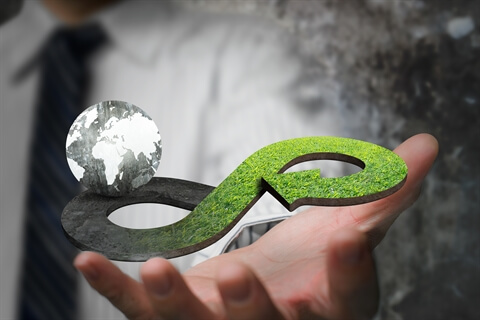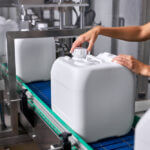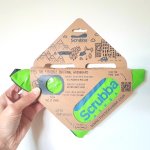Circular Brands Leading the Way for a Plastic-Free Future

The circular economy has been on the rise in the past few years, and it’s now widely considered to be one of the most effective ways to reduce our global waste, cut pollution and manage our resources more effectively. But what does it mean to be a circular brand and which businesses are helping consumers make better choices in a bid to be more plastic-free?
What are Circular Brands?
Circularity, whether it’s in fashion, tech or food production, is a process where the waste and pollution are reduced by the very design of the product. In circular design, the resources used to create the product are reused so every step of the production process is considered to lead back to sustainability and longevity. This means from more durable materials that are built to last to the recyclability of the product at the end of its life.
“Being circular is essential to sustainability for a few reasons”, explains Rachel Thompson, Head of Sustainability at MPB, “Nature is being depleted and polluted at completely unsustainable rates, and basic recycling is not a sufficient response. We need to reuse what has already been made and replenish nature rather than depleting it”.
There’s a risk in the sustainability sphere of greenwashing, which is where businesses claim to be sustainable or eco-friendly but they don’t take any actionable steps towards these claims. Certain terms like ‘natural’ or ‘green’ give the illusion of a sustainable, environmentally conscious brand, but these terms aren’t regulated and don’t actually carry any meaning. It’s important when choosing circular brands that you avoid this type of language and also choose businesses that back up their claims with transparent data.
There are plenty of businesses who claim to be eco-friendly but engage in polluting behaviors. H&M is a prime example, with a ‘green’ range and claims of recycling clothing, but they are a fast fashion business producing excessive quantities of waste and pollution. Rather, we should be spending money with zero waste circular brands who are genuinely interested in doing more for the planet rather than supporting global brands who are simply using sustainability as a marketing tool.
The Rise in Demand for Circular Brands
Consumers are keen to take action in reducing their plastic waste, and they are seeking out companies who have genuine environmental concern. In fact, this group of customers makes up a significant percentage of all consumers and has been consistently growing over the last few years. The shift in demand has been brought on by several factors, including the pandemic, the growing data on the climate crisis and the rising costs of products. People realize that they need to take responsibility for their actions and this has led them to lean more on businesses who adopt a circular business model.
Circular brands empower customers to make eco-friendlier choices and help businesses be more environmentally responsible with their manufacturing processes. It reduces waste and pollution, cuts down on the need for virgin materials and resources, and reduces long-term costs too.
Related: A Circular Economy… It Has No end
Circular Brands Paving the Way for a Greener Planet
AirRobe
AirRobe is a platform where global brands can come together to give customers access to circular fashion options. Using AirRobe’s Circular Wardrobe, you can add items to a digital wardrobe, choosing from numerous brands from one place, which makes it incredibly convenient. Customers can choose to resell, rent or recycle items on the pre-loved marketplace, enjoying an end-to-end solution that reduces the carbon footprint of your wardrobe and ensures you can be more responsible with your fashion purchases.
Consumers shop as usual, and any items they want can be added to the digital Circular Wardrobe. Once the item has been worn and loved, it can be relisted on AirRobe to be sold on to another person, removing the risk of the item going to waste but still giving customers the opportunity to enjoy new outfits throughout the year.
Back Market
Back Market is a marketplace which specializes in refurbished tech devices, with a mission to give old devices a new life and bring high quality refurbished tech to the masses. As consumers, we’ve become obsessed with the latest tech, from the newest edition of the iPhone to smart watches and gaming consoles. But this desire to always update the tech in our lives results in staggering levels of waste which is having a significant impact on our planet.
Refurbished technology means you don’t have to stick with your old phone or laptop, but you can upgrade without it costing the earth — literally and figuratively. Each item on Back Market is thoroughly checked for quality and usability, before being listed so you can be confident you’re always buying a high quality item.
HYLA mobile
Smartphones and tablets are an essential component in our lives now, but with constant reiterations and updates to take advantage of, they’re also one of the most discarded items. Throwing away tech devices pollutes our environment and also increases the demand for mining of new resources, which harms the planet in other ways.
A far more sustainable solution is to recycle gadgets and that’s where HYLA Mobile comes in. They work with leading manufacturers and service providers to reuse devices or their components so they don’t go to waste. So far, they’ve prevented over 6,500 tons of e-waste from ending up in landfill, and have reused over 50 million devices.
Enerkem
Canadian firm Enerkem have transformed the automotive industry with their technology, which uses trash to run your vehicle. It extracts carbon from trash that can’t otherwise be recycled which is turned into a gas that can be used for biofuels, such as methanol and ethanol. It can also be transformed into countless other chemicals which we can use in thousands of everyday products.
Already, it’s making huge waves in how cities in Canada are operating, with the city of Edmonton already reusing 90% of its waste and saving over 100,000 metric tons of landfill on an annual basis. Enerkem is the first company to produce these renewable fuels from non-compostable municipal waste at commercial scale. Their goal is to replace the use of fossil fuels to produce sustainable transport fuels and encourage circular waste management.
thredUp
We know that fast fashion is bad for the planet, but that doesn’t mean that everyone has the budget to shop from dedicated sustainable brands. thredUp is changing the landscape for shopping casually but with intention, serving as an online thrift store which rejects throwaway fashion culture and enables people to buy secondhand easily.
With thredUp, shoppers can buy with the same ease as any other eCommerce store, but the items listed are recycled and pre-loved, meaning that there’s no waste. It gives consumers the option to refresh their wardrobe consciously, without the expenditure or guilt that comes from sustainable brands or fast fashion respectively.
Conclusion
A circular economy is one of the most essential components to tackling the planetary crisis on the climate and ecosystems. By keeping resources in the loop for longer, we’re able to reduce our greenhouse gas emissions and the energy required to make products, while also reducing the quantity of waste heading to landfill. In choosing zero waste circular brands, consumers can play their part in cutting down on plastic waste and make more sustainable purchases, while still enjoying new products — albeit in a different way.




